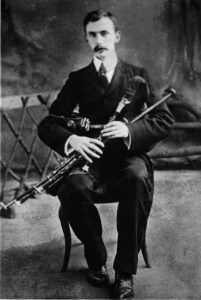Éamonn Ceannt (1881 – 1916) - Co-founder of the Irish Volunteers

Born as Edward Thomas Kent in Ballymoe, County Galway on 21 February 1891, to James Kent and Joanne Galway. Éamonn was the sixth of seven children.
His father was an officer in the Irish Royal Constabulary and the family would move with his assignments. Upon his father’s retirement, the family moved permanently to Dublin.
Éamonn became interested in the events of the Boer War and the 1798 Commemoration, which he was a part of, evoking a strong sense of Irish nationalism. He would then join the Gaelic League, meeting other men from the Easter Rising such as, Patrick Pearse and Eoin MacNeill.
As Ceannt became more involved in Nationalist movements, his interest in Irish culture grew and he began teaching Irish language classes. He was also a very talented musician, co-founding Cumann na bPíobairí (The Pipers Club), earned a gold medal at the 1906 Oireachtas, and was invited to play in front of Pope Pius X.
In 1907, Ceannt joined Sinn Féin and grew increasingly determined to see a free and independent Ireland. As someone passionate in all the cultural aspects of his country, it was inevitable that his interest would also lead him into the politics of Irish independence.
He found a vehicle for his political ideals in the ranks of the Irish Republican Brotherhood, Sinn Féin and was a founding member of the Irish Volunteers in 1913.
Éamonn Ceannt was one of the signatures of the proclamation and was appointed Commander of the 4th Battalion with Cathal Brugha as his second in command taking up positions in the South Dublin Union.
The Union witnessed some of the fiercest fighting of the rebellion. Three regiments of the British Army were involved in the retaking of the Union. They lost many officers and men. The battle lasted for forty-eight hours and casualties were high on both sides.
Ceannt surrendered only when Padraig Pearse issued a general order that all fighting was to stop. Éamonn Ceannt was arrested by British forces and incarcerated in Kilmainham Gaol.
He was court-martialed by a military court, found guilty, and sentenced to death by firing squad, which was carried out on the 8th of May.
Éamonn left behind his wife, Áine and son, Ronan. He was 34 years old.